Proprietary trading and retail trading offer distinct paths for participating in financial markets, each with unique advantages and challenges. Understanding the differences between trading with a prop firm and using a personal account is crucial for choosing the right approach. In this comprehensive guide, we’ll compare prop firm trading and retail trading across key factors.
What Is Prop Firm Trading?
Prop firm trading involves trading with capital provided by a proprietary trading firm. Traders must pass an evaluation to access funded accounts, share profits with the firm, and adhere to strict risk rules. Firms like FTMO and The Funded Trader are popular examples. Learn about FTMO.
What Is Retail Trading?
Retail trading involves trading with personal funds through a brokerage account. Traders have full control over their capital, strategies, and risk but bear all financial risks. Popular brokers include Interactive Brokers and TD Ameritrade. Explore Interactive Brokers.
Key Differences Between Prop Firm and Retail Trading
1. Capital Access
- Prop Firm: Provides access to large capital (e.g., $10,000–$2,000,000) without personal investment. Traders pay evaluation fees but don’t risk their own money.
- Retail Trading: Requires personal capital, limiting position sizes for traders with smaller accounts.
2. Risk Exposure
- Prop Firm: Losses are absorbed by the firm, provided traders follow risk rules (e.g., drawdown limits).
- Retail Trading: Traders bear 100% of losses, which can deplete personal funds.
3. Profit Sharing
- Prop Firm: Profits are split (e.g., 80/20 or 90/10), reducing the trader’s take-home earnings.
- Retail Trading: Traders keep 100% of profits but must cover trading costs and taxes.
4. Risk Management Rules
- Prop Firm: Strict rules, such as 5% daily drawdown or 10% maximum drawdown, enforce discipline but limit flexibility.
- Retail Trading: Traders set their own risk parameters, offering more freedom but requiring self-discipline.
5. Costs
- Prop Firm: Involves challenge fees ($100–$1,000) or subscriptions, but no personal capital is risked.
- Retail Trading: Involves broker commissions, spreads, and potential margin interest, paid from personal funds.
6. Access to Technology
- Prop Firm: Provides professional platforms (e.g., MT5, cTrader) and analytics tools at no extra cost.
- Retail Trading: Traders may need to pay for premium platforms like TradingView ($14.95/month). Visit TradingView.
7. Scalability
- Prop Firm: Offers scaling plans to increase account sizes based on performance.
- Retail Trading: Scaling depends on personal capital growth, which can be slower.
For a deeper comparison, check Investopedia’s guide to trading types.
Benefits of Prop Firm Trading
- Access to large capital without personal risk.
- Professional tools and mentorship.
- Structured risk management fosters discipline.
Benefits of Retail Trading
- Full control over strategies and profits.
- No evaluation fees or profit splits.
- Flexibility to trade any market or style.
Challenges of Each Approach
- Prop Firm: Strict rules, evaluation costs, and profit sharing can be limiting.
- Retail Trading: High financial risk and lack of professional support can be daunting.
Which Is Right for You?
- Choose Prop Trading If: You want to trade large capital, have limited personal funds, or prefer a structured environment.
- Choose Retail Trading If: You value full control, have sufficient capital, or want to avoid profit splits.
Top Prop Firms and Retail Brokers
- Prop Firms:
- FTMO: High capital and professional tools. Visit FTMO.
- The Funded Trader: Flexible evaluations. Explore here.
- Retail Brokers:
- Interactive Brokers: Low commissions and diverse markets. Learn more.
- TD Ameritrade: User-friendly for beginners. Check it out.
Conclusion
Prop firm trading and retail trading cater to different needs and goals. Prop trading offers access to capital and professional tools but requires adherence to strict rules and profit sharing. Retail trading provides freedom and full profits but demands personal capital and self-discipline. Evaluate your financial situation, risk tolerance, and trading style to choose the right path. Whether you join a prop firm like FTMO or trade with a broker like Interactive Brokers, preparation and strategy are key to success!
